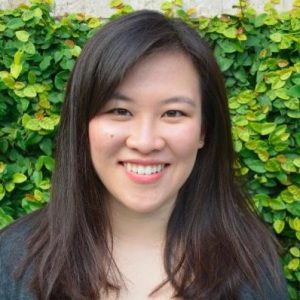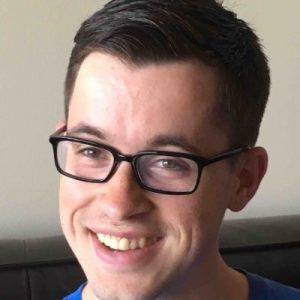 In our series of group interviews, Rice Computer Science alumni discuss their roles in similar companies or environments, talk about their jobs, and give helpful advice to CS majors and prospective students. Our first panel described working in startups. This week, we explore roles that support the IT economy. Meet Connie Feng and Patrick Dunphy, who both interned at Spiceworks then returned there as software developers after graduating from Rice.
In our series of group interviews, Rice Computer Science alumni discuss their roles in similar companies or environments, talk about their jobs, and give helpful advice to CS majors and prospective students. Our first panel described working in startups. This week, we explore roles that support the IT economy. Meet Connie Feng and Patrick Dunphy, who both interned at Spiceworks then returned there as software developers after graduating from Rice.
 Spiceworks was founded to help IT professionals connect with each other and with technology vendors across an information-sharing platform that empowers Help Desk and other teams to more effectively support their own customers. The company also provides free IT inventory and asset management tools, enabling IT support teams to remotely monitor and manage the health of their organizations’ devices. Connie and Patrick work with about 350 other employees at the company’s headquarters in Austin, Texas.
Spiceworks was founded to help IT professionals connect with each other and with technology vendors across an information-sharing platform that empowers Help Desk and other teams to more effectively support their own customers. The company also provides free IT inventory and asset management tools, enabling IT support teams to remotely monitor and manage the health of their organizations’ devices. Connie and Patrick work with about 350 other employees at the company’s headquarters in Austin, Texas.
Q: What prompted you to become a CS major?
Connie: I applied to Rice as a CS major. In high school, I didn’t know what I wanted to do until I took AP Computer Science during my senior year. We built a game in that class and I really liked how we approached the problem by breaking it down into smaller pieces and fitting the solutions together.
Patrick: I thought about maybe English or History, and then in college my friend took COMP 140 and told me he loved the problem-solving aspects of it. So I enrolled in it as a sophomore.
Q: What Rice courses impacted your career focus?
C: I took COMP 160 and COMP 140 at the same time. COMP 160 (Introduction to Computer Game Creation) made me want to continue in CS–I had a really great time taking it. One major reason was that we spent the last few weeks of the semester creating our own games, so everyone had a completely different game and it let me be creative and have a sense of ownership. I was amazed to be able to build this kind of project after just one semester. I also liked meeting and working with students from other years because the class also had some upperclassmen and graduate students. I think it was one of the first years this class was taught as a MOOC by Professors Warren, Rixner, and Greiner and it was a great format.
P: For me, it was COMP 310 with Dr. Wong. We learned to take ownership of larger projects and communicate with different people, see how they code. I loved the aspect of working for a software company–building something you take ownership of, but also talking to other people about the project, learning different ways of doing everything across the business. You also see different philosophies of work and life; it all makes the whole job more interesting.
Q: What was the Spiceworks internship like?
C: When I started my internship, I had never used Ruby on Rails, or done much HTML/CSS so I was expecting to just be reading up on it and learning for my first couple of weeks, but nope! On my second day I was given projects to work on, and some of my code went into production my first week there. My manager/mentor was supportive and helpful, and I feel that Rice CS gave me a great foundation to be able to pick up new things quickly.
P: Like Connie, I worked on features that were going into production, it was the same thing the first week of my internship. I also loved Austin and Texas so much and loved Spiceworks –can’t think of many better places where you can dive right in.
Q: Why return to Spiceworks?
P: I met with the founder in my interview. Everyone – no matter what position – can go in and talk to the executives – the founder, CEO — to talk about a question or a problem you’re having. So Spiceworks is big enough for plenty of opportunities, but at the same time small enough to walk into the CEO’s office. It’s a great thing.
C: When I was interviewing here –to be considered for the transition from intern to full-time– my interviews with one of the founders and the vice president of products really stood out. I especially liked the advice they gave me: “Don’t think of yourself as a Java programmer or a database person, etc. Think of yourself as a problem solver because that makes you open to new things.” The founder said that “college is for learning how to learn, don’t be afraid to make mistakes” –and this is what Professor Rixner has said as well!
My internship at Spiceworks taught me to become confident in the face of big projects and not feel overwhelmed. Even if at first glance, it’s something I’ve never done before and I have no idea how to do it, I know I will be able to figure it out. Spiceworks is a place where you can always have new experiences and continue to improve and grow.
Q: What’s the main difference between being an employee and a student?
P: You have to get used to a different schedule that isn’t just working at night. “Full-time” is an eight-hour grind during the day. Communication, too–you have to talk about why you chose to do a project this way, and talk with the product testers and other people.
C: Once again, ownership of the project. It’s not like in school where you can say “Oh, I didn’t do so well on that, but I’ll never touch it again so I can just let it go.”
Q: Do you have any advice for new CS majors?
C: DON’T overload yourself freshman year. I definitely overloaded both on classes and extracurriculars–there’s a lot of new stuff to try, but it doesn’t all have to be during freshman year when you’re still adjusting and transitioning to university life.
Also, this one is obvious: DON’T procrastinate. I didn’t actually follow through with this until my junior year when I started homework and projects pretty soon after they were assigned. Even though the classes were so much more difficult material-wise, I got much more sleep, did better in the classes, and felt much less stressed during my junior and senior years. It’s also extremely important to get a good partner for two-person projects – one that is willing to start on projects early and work on them together everyday.
DO study abroad. It was one of my favorite semesters! You’ll go out of your comfort zone, grow as a person, learn more about yourself, and meet people from all over the world. It’s totally possible if you plan ahead. I went to an engineering school in South Korea and the CS classes I took there transferred in as my upper-level CS electives.
P: Find something to do outside CS, and not just clubs. Your interests and hobbies are important. Talking to people, communication, people skills – those are things you don’t necessarily get to hone in classes. When you become a full-time worker, you’ll have such a great foundation that it doesn’t matter if you don’t know a specific language, you’ll be able to pick it up quickly. So spend time doing other things that interest you.
Also, when you are working in the industry, sometimes you need solve a tech problem, but sometimes it’s working with sales or other teams –and that’s when those critical thinking skills are important. You need that other perspective, and the experience you get from other activities. In my time at Rice, I was active in my residential college and worked in Engineers without Borders. I didn’t breathe CS day and night. I wanted to have conversations that had nothing to do with technical stuff.